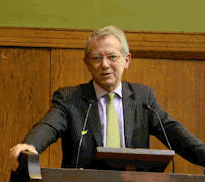|
|
|
|
|
|
|
News & Views item - December 2009 |
![]() Global Warming and the Two-Ton Limit. (December 4, 2009)
Global Warming and the Two-Ton Limit. (December 4, 2009)
 Now
just before the start of the
United
Nations Climate Change Conference in Copenhagen (December 7 - 18)
it's not surprising that Science has invited Sir David King, director
of the Smith School of Enterprise and the Environment, University of Oxford, UK,
and the former Chief Scientific Adviser of the UK to write this week's
editorial, "The Climate in Copenhagen".
Now
just before the start of the
United
Nations Climate Change Conference in Copenhagen (December 7 - 18)
it's not surprising that Science has invited Sir David King, director
of the Smith School of Enterprise and the Environment, University of Oxford, UK,
and the former Chief Scientific Adviser of the UK to write this week's
editorial, "The Climate in Copenhagen".
In Professor King's view: "The worst possible outcome at Copenhagen would be a weak protocol that solves nothing. The best outcome would be an agreement to delay the final protocol for another year. By the time the parties to the UN's Framework Convention on Climate Change meet in Mexico in December 2010, we could finally be in a position to set up a protocol with the power to solve the worst crisis that humans have ever faced collectively."
Professor King goes on to state what ought to be the bleedin' obvious that global warming is a global problem, therefore requires a global solution and should be seen as requiring a commitment from every homo sapiens on the planet.
His interpretation of how to determine that commitment equitably is "to develop a fully global cap-and-trade scheme that puts a single high price on carbon's head".
And to do that?
[T]he best we probably can aim for is an upper [CO2] limit of around 450 ppm. To do that, we need to bring annual global emissions down from about 30 gigatons (Gt) of CO2 today to 18 Gt by midcentury. Taking into account the predicted rise in population, that gives us an allowance of 2 tons of CO2 per person per year.
So, first world nations are then set "a straightforward downward trajectory that takes [them] from today's level to 2 tons per person per year by 2050". Of course Australia being one of the worst per capita polluters would need to get cracking.
At this point Professor King comes to the nub of his proposal:
Rapidly developing countries such as China and India, which have relatively low levels of emissions per capita, could temporarily increase their emissions before these too would start to fall toward the magic figure of 2 tons. The world's poorest countries, which have per capita CO2 emissions below the 2-ton limit and also are the ones that will be hardest hit by climate change, could benefit if included in this process, by selling their excess emission credits. This would produce cash to enable poorer countries to adapt to the ravages of climate change and provide an incentive for them to develop low-carbon technology.
Basically Professor King is outlining his version of a cap and trade system saying in effect, it doesn't matter how the world does it but just get to that 2-ton per capita per annum global limit.
That said, he also has a parting admonishment: "The ponderous pace set by thousands of negotiators will never yield a meaningful protocol without action by visionary leaders prepared to take a long view of the world's future".